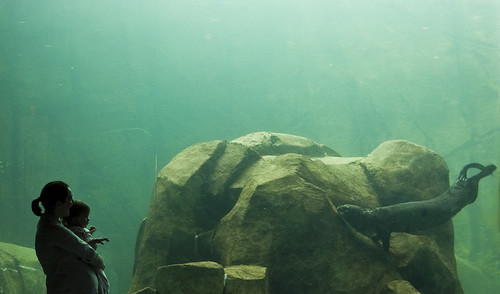
On a Mothers’ Day trip to the Pittsburgh Zoo yesterday, I had the pleasure of watching the antics of a baby sea otter. The docent explained that it had been found on an Alaskan beach along with its two dead parents, nursed on Pedialyte to stabilize it, and then shipped via FedEx to Pittsburgh, where to all appearances it is thriving.
It is one of those little stories that tells us what a remarkable time and place we live in. For the vast stretch of human history, I’m guessing, a foundling sea otter would have meant some useful fur and perhaps meat (does anybody eat sea otter?). Books like Rascal and Ring of Bright Water suggest that, for some decades in the twentieth century, somebody might have tried to make this otter a pet. Now, a network of commerce, civic institutions, and individual professionals is ready to swoop in and save the critter, at no small monetary cost. It is a privilege to live in a society that can afford to do such unnecessary things, and, on balance, I’m willing to say it represents something we can fairly call progress.
But what is the next step in such progress? The docent did not present a cause of death for the otter’s parents; but plainly, for many, further progress would mean at least making sure that human activities were not the cause. Hence we list the sea otter as a threatened species under the Endangered Species Act, and we can imagine all sorts of schemes to protect it and its habitat. Beyond that, as we have had occasion to discuss on this blog, some would say further progress would mean protecting it from the dangers and pains of nature itself — such as by eliminating animals who prey on them. And then, there are those who imagine that someday “we” — that is to say, our posthuman descendents — will be able to implement the Uplift of sea otters, granting them the gift of rational intelligence.
Now, I think it is fair to say that the consensus position of the vast quantities of science fiction I read as a much younger man in the 1960s and 70s was that in the future there would be no wild animals at all, and that a trip to a zoo might mean a look at exotic species like cats, dogs, and pigeons. The prospect of such a future is still a threatening card to play in the hand of environmentalism. But here is a great example of where extremes meet. For at a certain point, our vision of progress for the sea otter would mean its extinction just as surely as its entire habitat were paved over. The more we imagine ourselves managing the world of the sea otter, the less it is a wild animal, and the less it is a wild animal, the more it seems reasonable to place it within our technological dominion, until even its self-evident joie de vivre is not enough if it can’t tell us all about it.
Plainly, we are on this slope already — the otter I saw will likely spend the rest of its life in a zoo, and I for one will enjoy visiting it there. The question is, how slippery will this slope prove to be? It will be all the slipperier if we fail to note that, like any other good thing, there can be too much progress.
[Image: Sea otter at the Pittsburgh Zoo via flick user mikentiffy]

Futurisms
May 14, 2012

T-Rex doesn't want to be fed; he wants to hunt.